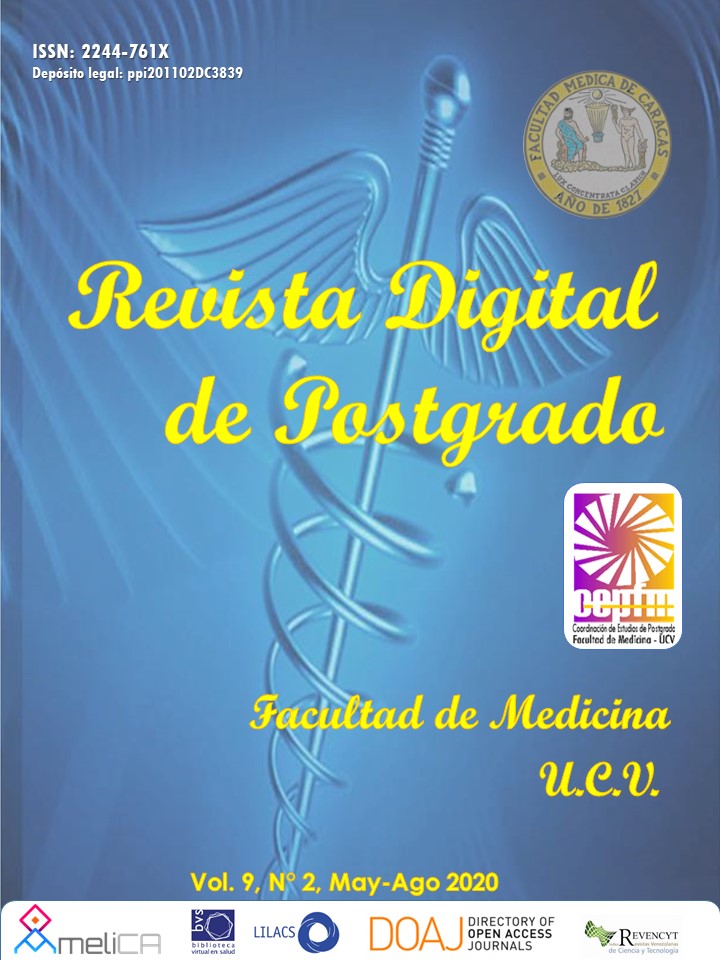Branched chain amino acids and health implications
Keywords:
BCAAs, deportistas, Neuropatias, cancer, cirrosis hepatica, encefalopatia hepatica, cancer hepaticoAbstract
The consumption of protein and especially essential amino acids play a fundamental role in the diet, in order to meet the body's nitrogen needs and the maintenance of body structures. In recent years nutrition and food technology are undergoing a profound transformation due to the development of the concept of functional foods and nutraceuticals. Both functional proteins and bioactive peptides are becoming very important since, in addition to their nutritional role as a source of amino acids, they are capable of exerting different specific biological effects on the immune system, the cardiovascular system or the gastrointestinal tract. Branched-chain amino acids (BCAAs), such as Leucine, Isoleucine and Valine, are considered useful for the treatment and prediction of some diseases. This review article collects information about branched-chain amino acids. and it’s positive use in the treatment of different pathologies such as neurological, liver, cardiometabolic diseases, cancer, in addition to it’s use in athletes. The following inclusion criteria were taken into account: 1. The search was carried out in recognized databases, 2. Articles were included from 2006 to date, 3. The search was carried out with words such as branched-chain amino acids and effect in different pathologies, with the inclusion of articles where their human consumption is mentioned, articles were excluded where amino acids do not intervene positively in their consumption and treatment of diseases.Downloads
References
- Augustin OM, Martinez V. Proteínas y péptidos en nutrición enteral. Nutrición Hospitalaria. 2006; 22(3): 1-14. https://doi.org/10.1267/ahc.22.401
- Caire-Juvera G, Vázquez-Ortiz FA, Grijalva-Haro MI. Amino acid composition, score and in vitro protein digestibility of foods commonly consumed in northwest Mexico. Nutrición Hospitalaria. 2013; 28(2): 365–371. https://doi.org/10.3305/nh.2013.28.2.6219
- Suárez-López MM, Kizlansky A, López LB. Evaluación de la calidad de las proteínas en los alimentos calculando el escore de aminoácidos corregido por digestibilidad. Nutrición Hospitalaria. 2006; 21(1): 47–51.
-Salas-Salvadó J. Nutrición y dietética Clínica. Madrid: Elsevier-Masson; 2019.
- Ruiz A. BCAAs: Aminoácidos de Cadena Ramificada. Revista de Salud y Bienestar; 2018.
- Salinas-García ME, Martínez-Sanz JM, Urdampilleta A, Mielgo-Ayuso J, Navarro AN, Ortiz-Moncada R. Efectos de los aminoácidos ramificados en deportes de larga duración: Revisión bibliográfica. Nutrición Hospitalaria. 2015; 31(2): 577–589. https://doi.org/10.3305/nh.2015.31.2.7852
- Gallego JG, Collado PS, Verdú JM, González-Gallego J, Sánchez-Collado P, Mataix-Verdú FJ. Nutrición en el deporte: ayudas ergogénicas y dopaje; 2006. In Salud y nutrición. Retrieved from https://books.google.com/books?hl=es&lr=&id=ZBip31e_QacC&pgis=1
- Blomstrand E, Møller K, Secher NH, Nybo L. Effect of carbohydrate ingestion on brain exchange of amino acids during sustained exercise in human subjects. Acta Physiologica Scandinavica. 2005; 185(3): 203–209. https://doi.org/10.1111/j.1365-201X.2005.01482.x
- Ruiz-Margáin A, Méndez-Guerrero O, Román-Calleja BM, González-Rodríguez S, Fernández-del-Rivero G, Rodríguez-Córdova PA, et al. Manejo dietético y suplementación con aminoácidos de cadena ramificada en cirrosis hepática. Revista de Gastroenterología de México. 2018; 83(4): 424–433. https://doi.org/10.1016/j.rgmx.2018.05.006
- Dam G, Aamann L, Vistrup H, Gluud LL. The role of Branched Chain Amino Acids in the treatment of hepatic Encephalopathy. Journal of Clinical and Experimental Hepatology. 2018; 8(4): 448–451. https://doi.org/10.1016/j.jceh.2018.06.004
- Maki H, Yamanaka-Okumura H, Katayama T, Ozawa Y, Hosoda A, Kurata N, et al. Late evening snacks with branched-chain amino acids improve the Fischer ratio with patients liver cirrhosis at fasting in the next morning. Clinical Nutrition ESPEN. 2019; 30: 138–144. https://doi.org/10.1016/j.clnesp.2019.01.003
- Ocaña-Mondragón A, Mata-Marín J, Uriarte-López M, Bekker-Méndez C, Alcalá-Martínez E, Ribas-Aparicio R, et al. Effect of branched-chain amino acid supplementation on insulin resistance and quality of life in chronic hepatitis C patients. Biomedical Reports. 2017; 85–90. https://doi.org/10.3892/br.2017.1012
- Shimomura Y, Kitaura Y. Physiological and pathological roles of branched-chain amino acids in the regulation of protein and energy metabolism and neurological functions. Pharmacological Research; 2018: 215–217. https://doi.org/10.1016/j.phrs.2018.05.014
- Mora GE, Moschella F, Navarro D, Reyes E, Vargas M. Dieta, estado nutricional y riesgo de cáncer. Archivos Venezolanos de Puericultura y Pediatría. 2014; 77(4): 202–209. Retrieved from: http://www.scielo.org.ve/scielo.php?pid=S0004-06492014000400007&script=sci_arttext&tlng=pt
- Ananieva EA, Wilkinson AC. Branched-chain amino acid metabolism in cancer. Current Opinion in Clinical Nutrition and Metabolic Care. 2018; 21(1), 64–70. https://doi.org/10.1097/MCO.0000000000000430
- Nicola L, Flores J, Zamora J. Tratamiento Nutricio del Paciente con Cáncer Gástrico. Cancerología. 2007; 2(4): 337–344.
How to Cite
Issue
Section
License
Usted es libre de:
- Compartir — copiar y redistribuir el material en cualquier medio o formato
- Adaptar — remezclar, transformar y construir a partir del material
- para cualquier propósito, incluso comercialmente.
Bajo los siguientes términos:
-
Atribución — Usted debe dar crédito de manera adecuada, brindar un enlace a la licencia, e indicar si se han realizado cambios. Puede hacerlo en cualquier forma razonable, pero no de forma tal que sugiera que usted o su uso tienen el apoyo de la licenciante.
- No hay restricciones adicionales — No puede aplicar términos legales ni medidas tecnológicas que restrinjan legalmente a otras a hacer cualquier uso permitido por la licencia.











